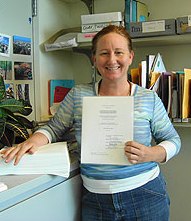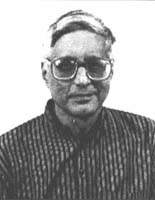|
The 2006 Sardar Patel Award
was held at the UCLA Campus. The winner was Gillian M. Goslinga and her
dissertation titled The Ethnography of a South Indian God: Virgin Birth, Spirit Possession and the Prose of the Modern World.

Gillian M. Goslinga
2006 Award Ceremony:
Abstract of Dissertation
Ceremony Program
Keynote Speakers
Letter from the Chairman of FSPAA
Letter from the UCLA History Chair
"The Ethnography of a South Indian God: Virgin Birth, Spirit Possession and the Prose of the Modern World."
This dissertation introduces a Hindu god by the name of Paandi Munisvaran, whose temple sits on the outskirts of the city of Madurai, Tamil Nadu. This god’s boons are the gift of children (often through the idiom of the sexual spirit possession of women) and the exorcism of unwanted spirits, curses, and black magic. Paandi also makes some women “dance” (aadi), and through them, advises individuals and families about their daily lives, interpersonal relations, and personal conduct. In the Madurai region, his popularity is steadily on the increase; during the peak months of the Tamil ritual calendar, lakhs of devotees come to his temple to ask for or reciprocate blessings. Known to dispense favors irrespective of caste and creed and according to codes of conduct (dharma), Paandi “catches” (pidi) Hindu, Muslim, Jain, and Christian women alike, married and not. On account of these idiosyncrasies, he will often trump the moral triumphalism of both present-day “traditionalist” and “modernist” South Indian discourses, opening up an unexpected and important oppositional space. My dissertation explores this oppositional space, both for what it reveals about popular Hinduism in a modernizing South India, and for how it talks back at common and gendered representations of village Hinduism, spirit possession, and the phenomenon of the virgin birth in scholarly and popular discourses.
Methodologically, I anchor my analysis neither in the objects “South India,” “Paandi’s Temple,” or “Paandi,” nor in the anthropological and feminist literatures that educated my thinking about reproduction, spirit possession, and the social, but rather in the encounter between both during my fourteen months of fieldwork. Crafting a “twined ethnography,” I apply arguments made recently in critical anthropology, postcolonial theory, and science studies that call for an awareness of the historical specificities that underpin modern conceptual practices and knowledge projects. As part of this “homework” (Visweswaran), and following Marilyn Strathern among others, I consider how the causal conjunction made in nineteenth-century British social anthropology between “blood kinship” and “the social” produced normative secular representations of sociality that reductively figured the social as the concrete relations between individuals only, and of persons as the sum of biological and social parts “ending at the skin” (Haraway). This last idea also concretized causal “relations” between parents and children, introducing a developmental temporality into theories of the person and the social, while habituating us moderns to locate the “sense” of things in their presumed related contexts (e.g. a child and the family, an individual and her society, etc).
Taking note of the civilizational politics embedded in these nineteenth-century derived notions, I point out that knowledge of the scientific “facts of reproduction” continues to be a marker of membership in modernity, automatically casting Paandi and his boons of children into the nonmodern or, as was often the case in the South Indian progressive press during my fieldwork, the “superstitious” and the “backward.” I review how these civilizational stakes were also at the heart of the anthropological “Virgin Birth debates” in the 1960s, a time of deep post/colonial and intellectual unrest, and argue that the theory of cultural relativism that consolidated during these debates and later enabled feminists to politically disengage gender from sex and culture from nature, nonetheless retained several of the conceptual structures of nineteenth-century common sense, making it still challenging to read a “virgin birth” practice as mattering (Barad) ontologically or politically.
Indeed, the deeply entrenched biologisms and the resulting perspectivism on the real under modernity made it especially difficult for me to appreciate and represent the complex and lived agencies and kinships at work in Paandi’s gift of children or his long-term relationships with devotees and his “wives.” Giving numerous close readings of ethnographic moments during fieldwork as well as narrated and witnessed Paandi-assisted conceptions and accounts of women’s relationships with him, I call for another hermeneutic to account for this South Indian god’s vivid and historical realism in the lives of his followers. I call this hermeneutic the “prose of the world” after Foucault (The Order of Things, 1970) and Paandi’s own trickster, oppositional interventions in the affairs of his devotees and my fieldwork. Paying attention to the prosaic idiom of Paandi’s “body” as experienced by devotees in the intimacy of their lives (e.g. dreams, his speech through mediums, visitations, the timings and propinquities of events) and reading “context” and “kinship” in a decidedly non-anthropological or modern way, my own prose attempts to recuperate Paandi’s variegated reproductive assistance and sakti, or power, not as exemplary of Hindu “cultural” practices or socio-historical conditions or understandings of reproduction and gender, but rather as vivid moral and ethical commentaries on the gendered tensions of social life and hierarchies at this time in Tamil Nadu, the uniquely South Indian ethos of god-devotee bhakti and mutual interdependence, and the dangers of textual reification or of forgetting one’s personal historical location.
Doubling back this hermeneutic onto a modern setting in Madurai – an equally famous regional medical fertility clinic only a mile from Paandi’s Temple and where I concurrently carried out eight months of fieldwork, I offer a critical account of the so-called “crisis of infertility” in Tamil Nadu and the enormous resources being deployed to ward it off and educate citizens about the “ facts of reproduction.” Suggesting this crisis to be in no small part about Tamil Nadu’s civilizational aspirations for ultra-modernity in the national and international imaginaries, I argue that knowledge of the facts of reproduction is once again being intimately tied to projects of social reform and the production of gendered modern subjects. The “infertile” woman is cast as the “barren” woman’s modern counterpart, empowered and knowledgeable. Reproductive technologies are cast as saving poor “ignorant” South Indian women from the horrors of “traditional” social stigma. Juxtaposing Clinic and Temple prosaically, however, complicates this civilizational rhetoric, since in the lived everyday of Tamil Nadu’s pro-natalist environment and nuclearization of the family, women whose bodies are medically found “infertile” are in truth far more vulnerable to repudiation than women and families that might have, or might still, appeal(ed) to a South Indian god such as Paandi."
Masters of Ceremony
Jyoti Solanki
Reception
4:30 p.m. to 5:30 p.m.
Entertainment
5:30 p.m. to 6:40 p.m.
Lighting of Lamp by Hamilton Brewart
U.S. National Anthem by The Boy Scouts of America, Troop 358, San Marino
Indian National Anthem by Arvind Joshi
Sardar Patel audio/video Program presentations by Vikram Kamdar
Entertainment Program by Sarita Vasa
Award Ceremony
6:40 p.m. to 8:00 p.m.
Welcome by Jitendra Mehta
Introduction of Rajmohan Gandhi by Navin Doshi
Keynote Address by Rajmohan Gandhi
Consulate General of India by Ambassador Shri Viswanathan
Dean of Social Sciences Dep. UCLA by Dr. Scott Waugh
Award criteria and introduction of committee by Dr. D. R. SarDesai
Presentation of Award by Ukabhai and Nalini Solanki
Acceptance of Award by David Stuligross
Donation to Red Cross by Big Saver Foods
Dinner
8:00 p.m. to 9:30 p.m.

Rajmohan Gandhi
Born 1935 in New Delhi. Author, commentator, and Visiting Professor.
Member, International Council of Initiatives of Change (formerly known
as Moral Re-Armament); Trustee, Friends of Moral Re-Armament (India)
Current positions: Visiting Professor in History for Fall
2001, UCLA.
Initiator and co-chair, Centre for Dialogue and Reconciliation, New
Delhi.
Jury member, Nuremburg Human
Rights Award.
Some previous positions:
Visiting Professor in History and Political Science, University of
Illinois, 1997, 1999 & 2001.
Emory University, Atlanta, 2000.
Obirin
University, Tokyo, 1997.
George Mason University,
Fairfax, Virginia, 1996.
Professor, Centre for Policy Research, New Delhi, 1992-2000
Member of the Rajya Sabha, the Indian Upper House, 1990-1992.
Convener,
Joint Parliamentary Committee of both Houses for the Scheduled Castes and Tribes, 1990-92.
Leader, Indian Delegation, UN Human Rights Commission, Geneva, 1990.
Editor, Indian Express, Chennai (Madras), 1985-87.
Fellow, Woodrow Wilson
Center for Scholars, Washington DC, 1984-5. Member of the Press Council of India, 1982-84.
Chief Editor, Himmat Weekly, Mumbai (Bombay), 1964-81.
Honors received
include Honorary Doctor of Laws, University of Calgary, Alberta, 1997.
Honorary Doctor of Philosophy, Obirin
University, Tokyo, 1997.
Honorary Professorship, University of Osh, Kyrgyz Republic,
1996.
Books published include:
Revenge and Reconciliation: Understanding South
Asian History, Penguin, New Delhi, 1999.
Rajaji: A Life (biography of Chakravarti Rajagopalachari,
1878-1972, Governor-General of India, 1948-1950), Penguin, New Delhi,
1997.
The Good Boatman: A Portrait of
Gandhi, Viking, New Delhi, 1995.
Patel: A Life (biography of Vallabhbhai Patel, 1875-1950, Deputy Prime Minister of India, 1947-1950),
Navajivan, Ahmedabad, 1990.
Understanding the Muslim Mind,
Penguin, New Delhi, 1987.

Scott L. Waugh
Scott L. Waugh is the Dean of Social Sciences at UCLA. As dean, he is
responsible for the leadership of some of UCLA’s largest and highest-ranked departments, including
anthropology, economics, geography, history, political science, sociology, communication studies, ethnic
studies, chicana/chicano studies, women’s studies, and ROTC programs. Nearly half the undergraduate degrees awarded
by UCLA each year are awarded in the Social Sciences. Also reporting to Waugh are three
interdisciplinary research centers: the Center for the Study of Women, the Cotsen Institute of Archaeology, and the
Institute for Social Science Research.
Waugh graduated summa cum laude in history from UCLA in 1970. He earned
his doctorate in English History from the University of London. A member of the UCLA faculty since
1975 in the Department of History, he has held a number of leadership positions at the university,
including the chair of the Department of History and chair of the Council on Educational Development.
Waugh has received numerous honors and fellowships including two grants
from the National Endowment for the Humanities and the UC President’s Fellowship in the
Humanities. He has also been the recipient of one of UCLA’s highest honors, The Distinguished Teaching
Award. Among his many publications on Medieval English History are the books: The Lordship of England
(Princeton, 1988), England in the Reign of Edward III (Cambridge, 1991), and Christendom and Its
Discontents (Cambridge, 1996, Editor).
Dear friends,
This year we are celebrating the presentation of Second Sardar
Patel Dissertation award Facilitated by Friends of Sardar Patel Association.
I am extremely delighted to hear from the Evaluation Committee that they
have unanimously designated Dr. David Stuligross as the winner of this
prestigious award. We extend our heartiest congratulation to Dr. David
Stiligross for being selected to receive this prestigious award. The title
of his dissertation for which he received the Ph.D. degree from a highly
rated University of California Berkely in the current year 2001 is “A piece of
Land to Call One’s Own” (this refers to newly created state of Jharkhand in
India).
We record with gratification that the creation of the Sardar Patel Endowment
at UCLA has generated tremendous excitement among the students of various
universities all over America to contest the annual award. We feel very
proud of such a wonderful accomplishment. It encourages us to concentrate
all our efforts more aggressively to circulate our message reaching to each and
every prospective participant. We do appreciate the valuable cooperation
offered by the department of history at UCLA.
Our sincerest thanks to our chief adviser Dr. D.R. SarDesai, Emeritus
Professor of History at UCLA and chair of the Sardar Patel Dissertation
Award Evaluation Committee and the esteemed members of the Committee who
have amazingly scrutinized hundreds of pages of materials leading to the
selection of the award winner.
It is my earnest desire to develop a center at UCLA providing rich cultural
heritage of India which include Arts, Music, Dance and Literature.
Sincerely,
Lalchand Gaglani
SARDAR PATEL DISSERTATION AWARD
From its Establishment to the Present
On
October 31, 1999, the 124th birth anniversary of Bharat Ratna Sardar Vallabhbhai
Patel, an endowment of $250,000 was pledged to UCLA (it was fully redeemed
a year later) by the Friends of Sardar Patel Award Association of Los
Angeles to enable the establishment of an annual award of $10,000 for the best
Ph.D. dissertation on Modern India in Social Sciences, Humanities,
Education and Fine Arts completed at any U.S. university in the previous
year. The award, to be administered by UCLA's History Department would honor the
memory of the one of the greatest sons of India, Sardar Vallabhbhai Patel,
who along with Mahatma Gandhi and Jawaharlal Nehru, constituted the
triumvirate that was primarily responsible for the advent of India's
independence in 1947. The Sardar was truly the architect of Modern India as
a political entity being the pivotal force behind the integration of over
500 princely states, without which we might truthfully say, there would be no
India as a state we have known in the last half century. It may be added
that as of this date, there is no doctoral dissertation award of this
magnitude in the United States in any of the academic fields mentioned above.
The Sardar Patel Dissertation Award is expected to raise the level of
academic discourse on Modern India in the United States. The winners of the
award will be called Sardar Patel Scholars, who would signify distinct
scholarly merit and intellectual excellence in Indian Studies in this
country.
The establishment of the Award on October 31, 1999 was marked by a banquet
for 600 persons drawn from UCLA's academic community, donors to the Sardar
Patel Dissertation Award Endowment, and other prominent members of the
Indian-American community. On that day, there was a screening of the feature
movie, Sardar, directed by Ketan Mehta, an exhibition of photographs
depicting the life of Sardar Patel and an inspiring address by Rajmohan
Gandhi, grandson of Mahatma Gandhi and of Chakravarti Rajagopalachari (Rajaji)
and distinguished author of the definitive biography of Sardar Patel.
The first Sardar Patel Dissertation Award was conferred on Dr. Srirupa Roy,
Assistant Professor of Political Science at the University of Massachusetts
at Amherst by Navin and Pratima Doshi, donors of the Doshi Chair at UCLA in
the distinguished presence of Shri Inder Kumar Gujral, former Prime Minister of
India. at a banquet attended by over 400 persons at the Sheraton Anaheim on
October 29, 2000. Dr Roy completed her Ph.D. at the University of
Pennsylvania on "Divided We Stand: Diversity and National Identity in India,"
under the able supervision of Professor Ian S. Lustick.
And now, on December 2, 2001, we meet to honor Dr. David Stuligross,
presently Assistant Professor of Peace Studies at Colgate University, as the
winner of the Sardar Patel Dissertation Award for the year 2001 for his
doctoral dissertation on ""A Piece of Land to Call One's Own: Ethnic Federalism
and Institutional Innovation in India." This work on the emergence of
Jharkhand as one of the three new states in India was completed in the
Political Science Department of the University of California at Berkeley under
the esteemed guidance of Professor Jyotirindra Das Gupta .
UCLA's Department of History, the Friends of Sardar Patel Award Association
and the Indian-American community of Southern California supporting the
activity, warmly congratulate Dr. DAVID STULIGROSS as the new SARDAR PATEL
SCHOLAR. May the high level of his scholarship inspire generations of doctoral
students across the U.S. to perpetuate the study of India in the
consciousness of this great nation. May the work of the Sardar Patel
Scholars blaze the trail for successive winners of this prestigious award for
all times to come.
D.R.SarDesai
Chair, Sardar Patel Dissertation Awards Committee, UCLA
|